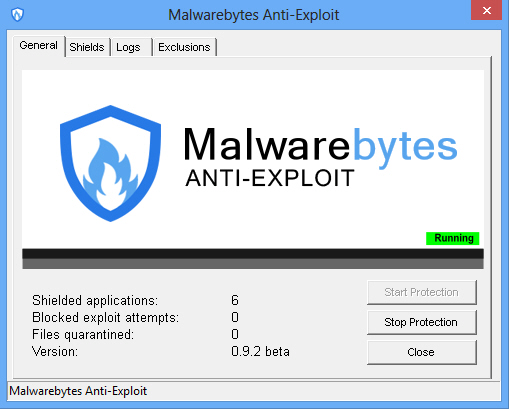 Malwarebytes has released the first public beta of Malwarebytes Anti-Exploit, a rebranded and improved version of ZeroVulnerabilityLabs’ ExploitShield. And just as in its previous incarnation, Anti-Exploit is an extremely easy-to-use tool which protects popular applications from zero-day exploits, web-based vulnerability exploits and more.
Malwarebytes has released the first public beta of Malwarebytes Anti-Exploit, a rebranded and improved version of ZeroVulnerabilityLabs’ ExploitShield. And just as in its previous incarnation, Anti-Exploit is an extremely easy-to-use tool which protects popular applications from zero-day exploits, web-based vulnerability exploits and more.
The full list of shielded apps includes browsers (Firefox, Chrome, IE, Opera), Microsoft Office (Word, Excel, PowerPoint), Media Players (Windows Media Player, VLC, Winamp, QuickTime), PDF-related tools (Adobe Reader, Foxit Reader, Adobe Acrobat) and more (Java, Windows Script Host, Windows Help).
Perhaps best of all, though, is the program’s extreme simplicity. There’s no configuration involved, no setup, no signature updates or anything else: just install and launch it, and Malwarebytes Anti-Exploit immediately goes to work, shielding your system from exploits -- even undiscovered -- which might be used by malware to infect your PC.
If you need more control, though, right-clicking the Anti-Exploit system tray icon provides one or two options. A basic console tells you how many exploits have been blocked, for instance, and provides simple logs. Usefully, you can also turn protection off on demand, handy for troubleshooting if you find your system behaves oddly after installation.
Otherwise, though, Anti-Exploit just works, running in the background without you ever noticing anything at all.
How reliable is this? It’s hard to evaluate, but the fact that Malwarebytes has just bought the company, largely for this technology, must tell us something about its potential.
Even now, though, there’s a lot to like about Malwarebytes Anti-Exploit. It’s compact and lightweight (RAM usage rarely reached 3MB on our test PC), protects a lengthy list of major programs, and is most unlikely to conflict with your regular antivirus package. Take a look.

